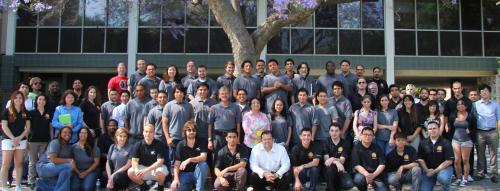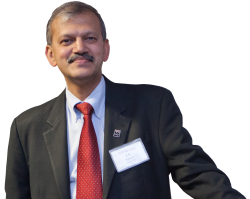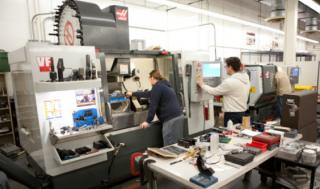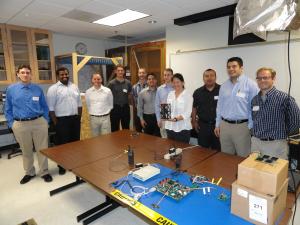Spectral Lines: Students posting solid gains from AIMS2 grant
Two years after the CSUN College of Engineering and Computer Science was awarded the largest grant in its history—a five-year, $5.5 million U.S. Department of Education HSI-STEM grant—the program, called Attract, Inspire, Mentor and Support Students (AIMS2), is continuing its impressive momentum and showing unambiguous signs of success.
AIMS2, a collaboration between CSUN and two feeder community colleges, College of the Canyons and Glendale Community College, is designed to increase the number of low-income, Hispanic and other underrepresented students graduating from CSUN with engineering and computer science degrees. Students in the program, half from CSUN and half from the community colleges, have access to special faculty mentoring and advisement, tutoring and peer mentoring, social activities, field trips and summer research opportunities.
Now entering its third year, AIMS2 has placed iPads in the hands of all participating students and faculty, who are using them to good effect in their classes. Last summer, students in the program again took part in research in CSUN labs, and some are now beginning to transfer into CECS from the community colleges.
Perhaps most significant, however, are the program’s metrics. Recently, for example, the Hispanic Association of Colleges and Universities (HACU) announced 20 scholarships nationally, and two of those went to students in CSUN’s AIMS2 cohort. And overall, the program is responsible for a huge improvement in persistence—defined as continuing enrollment from one semester to the next. For cohort 1, the persistence rate at the end of year 1 was 96.7%, while a comparison group’s was 78.7%. For cohort 2 the persistence rate was 100%, compared to the comparison group’s persistence rate of 90.8%. Students in the AIMS2 cohorts are also earning better grades while enrolling in more classes compared to their peers. Persistence is widely considered the key to increasing graduation rates in STEM fields.
“We’re about midway through the grant, and the students seem to be doing really well,” says S. K. Ramesh, CECS dean and principal investigator on the grant.
Moving forward, Ramesh intends to focus some energy on ensuring the AIMS2 students good jobs in industry after they graduate by leveraging the college’s industry partnerships. He hopes companies with a stake in its success will also help sustain the program after the grant funding runs out in 2016.
By then, he may have some help from alumni of the program. At one of the program’s social events, several students who took part in summer research projects said, “When I graduate and find a job, I want to come back and support this program.”
A message from the Dean
February 6, 2014Industry partnerships – HAAS
February 6, 2014Industry Partnerships – Jet Propulsion Laboratory
February 6, 2014
Leave a reply Cancel reply
-
Vidya Nandikolla, Mechanical Engineering – AIMS^2
March 25, 2016 -
Tech Fest Spring 2009
April 30, 2009 -
CECS leaves its mark on state capital
February 20, 2015





